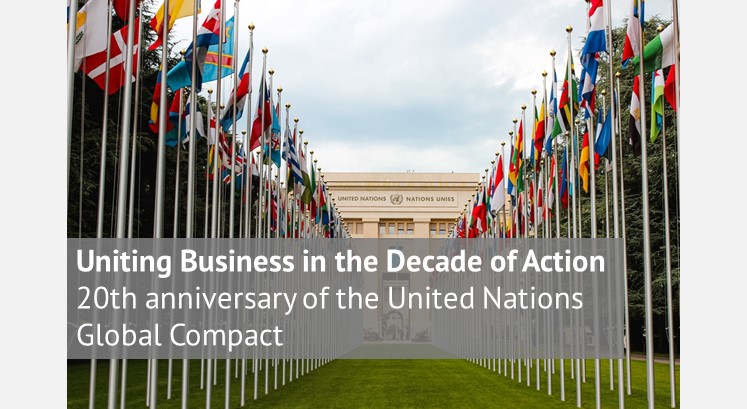On the occasion of the 20th anniversary of the UN Global Compact and the 5th year since the UN Sustainable Development Goals (SDGs) launch, the UN Global Compact, in cooperation with DNV GL, released the UN Global Compact 20th-Anniversary Progress Report: Uniting Business in the Decade of Action.
The purpose of the report is to assess how companies participating in the UN Global Compact adopted the ten principles and the progress that participants have made so far to lay the groundwork for the next ten years. The report also assesses companies’ performance on critical sustainability issues and examines the necessary systemic changes and actions to achieve the SDGs by 2030.
The Ten Principles
Since its launch, the UN Global Compact has called on companies to promote best practices and strategies to work responsibly and ethically to create a sustainable environment. The UN Global Compact drew ten universal principles from the significant UN conventions and charters relating to human rights, environment, labour and anti-corruption, and taking actions that promote societal goals and the implementation of the SDGs.
Since the launch of the 2030 Agenda for Sustainable Development, companies have tended to contribute positively to the SDGs and develop policies that cover all ten principles. However, there is a gap between policy implementation levels and work to integrate the ten principles into the operations and strategies of the private sector. Only a few companies apply the ten principles to assess and address their risks and impacts. Because policy alone is not sufficient to bring about a deeper change in sustainable business, the business community must move from policy commitments and obligations to action that can lead to improvements in actual performance.
This is especially true in social dimensions such as labour and human rights. The report found that while a large proportion of companies conduct an environmental impact assessment, the conduct of human rights and anti-corruption impact assessments for employment is minimal.
Looking to the Decade of Action: achieving the required change
In the report, the UN Global Compact called on all companies to lead the transformational changes necessary to create the world we want, by:
- Raise the ambition of the SDGs
The world is not yet on the right track to achieving the SDGs, and the scale and pace of change to achieve the SDGs has not been significant or fast enough. Although the awareness of the SDGs is high, according to the report, only 39% of companies have goals that they believe are ambitious sufficient to advance the 2030 Agenda. Companies only have a Decade of Action to reverse this impasse by taking an in-depth look at where they are missing and setting industry goals, standards, and implementation plans. In this way, companies will contribute to achieving the change and transformation required to intensify ambition sufficiently.
- Advocating ambitious policies and participating in collective action
Despite the progress that has been made so far, there is also much to do. Although companies and their related systems are moving in the same direction, this is not done in a concerted effort. Companies and industries, in general, need agreed ambitions, goals, and guidelines to help them coordinate and focus on supporting the achievement of the SDGs.
- Merging the ten principles completely
Policy alone is not enough to drive change when there is a gap between the levels of policy implementation and work required to integrate the ten principles into company operations and strategies. The report shows that the ten principles and SDG have not yet been sufficiently integrated into most companies’ governance and strategy systems and that they are not adequately present in decision-making and action. It is clear that companies need to move from policy to action. They need to integrate the ten principles to their business strategies and implement them as part of their operations with a goal to enhance sustainability outcomes.
There is still a lot to do
COVID-19 highlights weaknesses in health, social and economic aspects that widen social inequality and expose how fragile we are on a global scale and the rampant inequalities. In addition to the many looming crises, from climate change to biodiversity loss, they all demonstrate that the SDGs is not the ideal we aspire to reach but the basic requirement for creating a just society and a habitable planet.
Today, let’s use COVID-19 as a wake-up call to correct the path, to take more ambitious actions, and drive the transformational changes required to accelerate the shift towards a sustainable and brighter future.
Photo by Mat Reding on Unsplash

